In March of last year, a piece appeared in the op-ed section of Al-Quds, a Palestinian Arabic newspaper, written by Zafer al Rimawi from Nafha prison in Israel. It urged the Palestinian National Authority to be more aggressive in negotiating for the release of Palestinian prisoners through the Road Map for Peace. An Israeli military court has sentenced Zafer (27) to thirty two years in prison.
In Beit Rima, a town of about 6,000 people, many of the inhabitants bear the family name of al-Rimawi, which simply means “of Rima.” The town boasts of ten martyrs, men who have lost their lives resisting the Israeli occupation, and 53 prisoners, thirty of whom have been sentenced to life or to more than twenty years each.
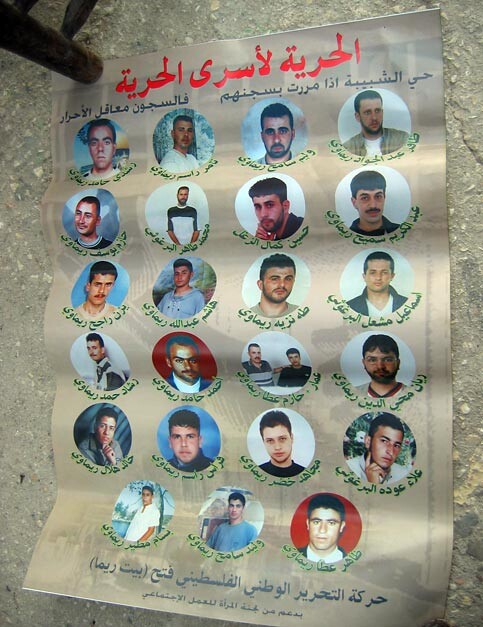
A poster with images of imprisoned Beit Rima residents. (Rima Merriman)
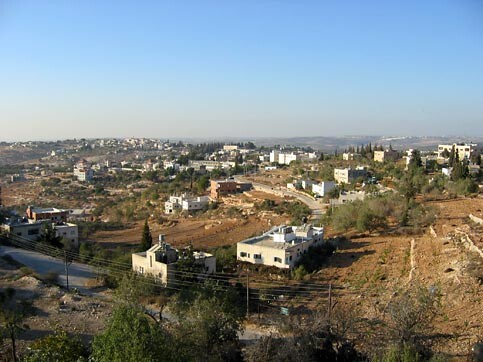
View of Beit Rima from the top of Abdel Jawad’s house. (Rima Merriman)
Farmer Abdel Jawad Abdel Rahman is the father of Zafer, three other sons, and one daughter. Muheeb (30), a director at the Ministry of Youth and Sports, has named his youngest son “Zafer,” in honor of his imprisoned brother. Mujeeb (29) helps Abdel Jawad farm the 37 dunums of land the family owns. Muneef (25), is a senior at Birzeit University studying sociology. He is wanted by the Israeli forces and is in hiding. Manal has just graduated from Al-Quds University with a degree in social work.
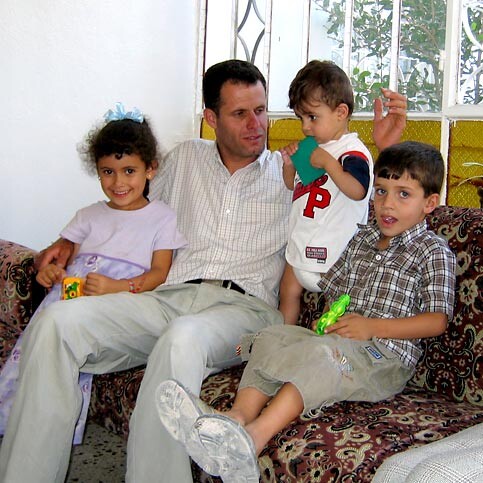
Muheeb with his children, including baby Zafer (chewing on a Palestinian ID card), named in honor of Muheeb’s imprisoned brother. (Rima Merriman)
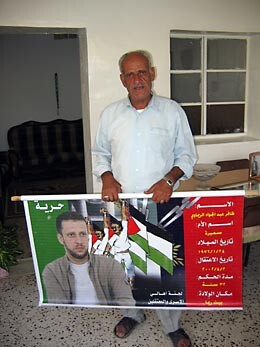
Abdel Jawad with Zafer’s poster. (Rima Merriman)
But a dark shadow is cast on this town, as it is on many other towns in the West Bank, by the presence of several Israeli settlements that ring the town, choking its natural expansion and laying claim to some of its lands. Halmeesh, the closest, has taken 1000 dunums (250 acres/1 km2) of the town’s lands. In a few weeks, the olive oil season will start and many townspeople will be unable to harvest olives off their lands because they won’t be allowed to get close to the settlements.
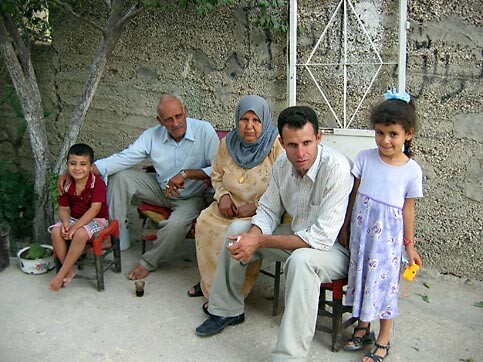
Zafer’s parents, Abdel Jawad and Samira, with their oldest son Muheeb and their grandchildren. (Rima Merriman)
Growing up, Zafer distinguished himself in school early on both academically and socially. But his schooling was interrupted by the first Intifada. He was arrested as a teenager and spent five years in Israeli prisons. After his release, he studied independently for the high school qualifying exam (Tawjihi) and made good grades. He joined al-Quds University in Abu Dis and was in his last year of law school when he, along with close to 300 others, were arrested at the Palestinian National Security Compound. The Israelis singled him out for special treatment, taking him in a landrover and beating him unconscious, as witnesses later reported.
Zafer’s first interrogation period at the Moskoubieh (Russian Compound in Jerusalem) lasted for 65 days, during which time he was tortured and kept naked in a one meter by one meter holding cell. His father learned through Zafer’s lawyer that Zafer had to be taken to a recovery room, where he stayed for three weeks due to the severity of the torture. During a second interrogation, while Zafer was at Nafha, Abdel Jawad received a call from an Israeli medical doctor who introduced himself as being associated with the medical unit which oversees prisoner affairs. The doctor asked Jawad two ominous questions and then hung up. “Was Zafer living with you before his arrest?” “What was his health like then?” The family was unable to get any further information, but they dreaded the worst. Much of this was kept from Zafer’s mother.

Zafer running for election at Al-Quds University in Abu Dis. (Rima Merriman)
Zafer’s father is not allowed to visit him. His mother has been able to visit only once in three years. Each time she applies for a pass, she is informed that she is no relation to Zafer and has to go through many organizations to correct this misconception. She is on her second round of proving that she is his mother. During that one visit, she was prevented from handing him the pants, shirt, underwear and slippers he had requested through the appropriate channels.
A year and a half ago, Israeli intelligence officers, Riyad and Iyas, came looking for Muneef. They ransacked the house and now periodically show up to look for him. Muneef remains on the run.
Rima Merriman is a freelance writer and a communications specialist. She has been working in the West Bank for the past four months.




